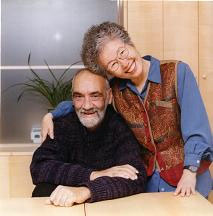Solution Focused Therapy - Where Do I Want to Go from Here?

Solution Focused Therapy or Brief Therapy (link to Solution-Focused Brief Therapy: Its Effective Use in Agency Settings By Teri Pichot, Yvonne M. Dolan) focuses on what clients want to achieve through therapy, rather than on the problem(s) that made them seek help.
The approach does not focus on the past, but instead focuses on the present and future. The counselor asks the client to envision their preferred future and then, working with the counselor, the client starts to work toward achieve this goal(s).
*****
“Founders”: Steve de Shazer and Insoo Berg
Problem talk creates problems. Solution talk creates solutions. - Steve de Shazer (1940-2005)
Whether we admit it or not, pre-assumptions we have about our clients are spilled over in our interactions with clients in a subtle and not so subtle manner. - Insoo Kim Berg (1935-2007)
*****
In Solution Focused or Brief Therapy, the counselor and client may work on specific challenges such as improving a grade in a particular course or may set goals for many components in the client’s life. For example, in taking or reviewing a whole health inventory, the client may be asked where she or he would like to be in these areas and the strategies he/he has about how to achieve these goals.
The approach does not focus on the past, but instead focuses on the present and future. The counselor asks the client to envision their preferred future and then, working with the counselor, the client starts to work toward achieve this goal(s).
*****
“Founders”: Steve de Shazer and Insoo Berg
Problem talk creates problems. Solution talk creates solutions. - Steve de Shazer (1940-2005)
Whether we admit it or not, pre-assumptions we have about our clients are spilled over in our interactions with clients in a subtle and not so subtle manner. - Insoo Kim Berg (1935-2007)
*****
In Solution Focused or Brief Therapy, the counselor and client may work on specific challenges such as improving a grade in a particular course or may set goals for many components in the client’s life. For example, in taking or reviewing a whole health inventory, the client may be asked where she or he would like to be in these areas and the strategies he/he has about how to achieve these goals.
Techniques
Looking for previous solutions
SF counselors have learned that most people have previously solved many problems and probably have some ideas of how to solve the current problem. To help clients see these potential solutions they may ask, "What did you (or others) do that was helpful in the past?"
Present and future-focused questions vs. past-oriented focus
The questions asked by SF counselors are usually focused on the present or on the future. This reflects the basic belief that problems are best solved by focusing on what is already working, and how a client would like their life to be, rather than focusing on the past and what isn’t wanted. For example, they may ask, "What will you be doing in the next week that would indicate to you and other that you are continuing to make progress?"
Compliments
Validating what clients are already doing well, and acknowledging how difficult their problems are encourages the client to change while giving the message that the counselor has been listening and cares. In SF therapy, compliments are often conveyed in the form of appreciatively toned questions of “How did you do that?” that invite the client to self-compliment by virtue of answering the question.
Inviting the clients to do more of what is working.
SF counselors invite the client to do more of what has previously worked, or to try changes they have brought up which they would like to try – frequently called "an experiment." As Dr Phil puts it, "How’s that working for you?"
SF counselors have learned that most people have previously solved many problems and probably have some ideas of how to solve the current problem. To help clients see these potential solutions they may ask, "What did you (or others) do that was helpful in the past?"
Present and future-focused questions vs. past-oriented focus
The questions asked by SF counselors are usually focused on the present or on the future. This reflects the basic belief that problems are best solved by focusing on what is already working, and how a client would like their life to be, rather than focusing on the past and what isn’t wanted. For example, they may ask, "What will you be doing in the next week that would indicate to you and other that you are continuing to make progress?"
Compliments
Validating what clients are already doing well, and acknowledging how difficult their problems are encourages the client to change while giving the message that the counselor has been listening and cares. In SF therapy, compliments are often conveyed in the form of appreciatively toned questions of “How did you do that?” that invite the client to self-compliment by virtue of answering the question.
Inviting the clients to do more of what is working.
SF counselors invite the client to do more of what has previously worked, or to try changes they have brought up which they would like to try – frequently called "an experiment." As Dr Phil puts it, "How’s that working for you?"
The Miracle Question

A key part of Solution Focused Therapy is the “Miracle Question”. It goes like so:
"Suppose our meeting is over, you go home, do whatever you planned to do for the rest of the day. And then, some time in the evening, you get tired and go to sleep. And in the middle of the night, when you are fast asleep, a miracle happens and all the problems that brought you here today are solved just like that. But since the miracle happened over night nobody is telling you that the miracle happened. When you wake up the next morning, how are you going to start discovering that the miracle happened? ... What else are you going to notice? What else?"
"Suppose our meeting is over, you go home, do whatever you planned to do for the rest of the day. And then, some time in the evening, you get tired and go to sleep. And in the middle of the night, when you are fast asleep, a miracle happens and all the problems that brought you here today are solved just like that. But since the miracle happened over night nobody is telling you that the miracle happened. When you wake up the next morning, how are you going to start discovering that the miracle happened? ... What else are you going to notice? What else?"
Goals
Goals must be stated positively and in a way that progress can be noted. If a client wants to lose weight, he would say “I want to achieve a normal weight which means I need to lose 20 pounds. I will do this by following the National Food Guide and exercising 30 minutes daily.” vs. “I don’t want to be fat.”
Let’s say a person wants to get out of poverty. What is the five year plan, four year plan … one week plan in order to start to realize this goal.
As with strengths based therapy, the client is helped to identify their skills and resources. Skills may be internal resources like determination, belief, past experiences and intelligence. Resources can include external ones such as partners, family, friends, and support groups.
Let’s say a person wants to get out of poverty. What is the five year plan, four year plan … one week plan in order to start to realize this goal.
As with strengths based therapy, the client is helped to identify their skills and resources. Skills may be internal resources like determination, belief, past experiences and intelligence. Resources can include external ones such as partners, family, friends, and support groups.
Sample Session
In our Sample Session Seven - Solution Focused - Mary knows what she wants but doesn't know how to get there. Ideally, Mary would come up with solutions on her own, using her skills and her own resources. In this situation, Mary used her personal quality of stick-to-it-ness and her primary resource was Joan herself.
One criticism of this session is that Joan was steering. In theory Joan should have worked with Mary to lay the smorgasbord of ideas out and Mary would have made the best choice. In practice, however, if a counselor is aware of an option that works (and that others aren't working), why would she not encourage the client to at least explore a good thing?
One criticism of this session is that Joan was steering. In theory Joan should have worked with Mary to lay the smorgasbord of ideas out and Mary would have made the best choice. In practice, however, if a counselor is aware of an option that works (and that others aren't working), why would she not encourage the client to at least explore a good thing?
Further Reading and Video
Books
"Solution-Focused Brief Therapy: Its Effective Use in Agency Settings" by Teri Pichot (Author), Yvonne M. Dolan (Author) 2003
"What's Right with You!" by Barry Duncan, HCI, 2005
Video on Solution Focused counseling.
http://www.youtube.com/user/bportela
"Solution-Focused Brief Therapy: Its Effective Use in Agency Settings" by Teri Pichot (Author), Yvonne M. Dolan (Author) 2003
"What's Right with You!" by Barry Duncan, HCI, 2005
Video on Solution Focused counseling.
http://www.youtube.com/user/bportela
There are only two ways to live your life. One is as though nothing is a miracle. The other is as though everything is a miracle. - Albert Einstein
